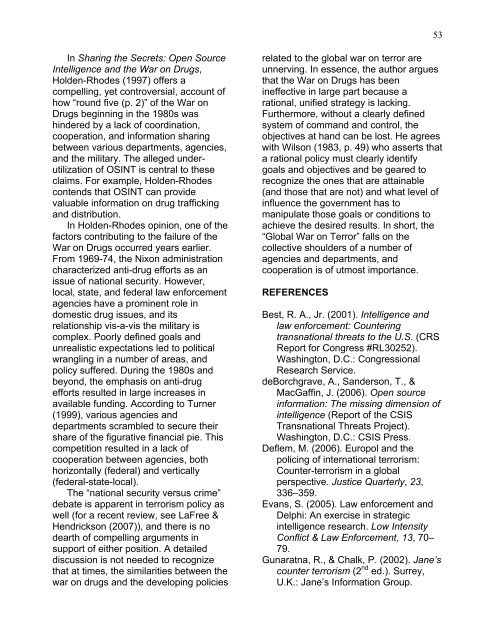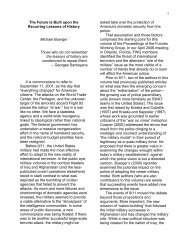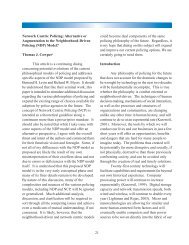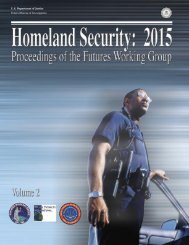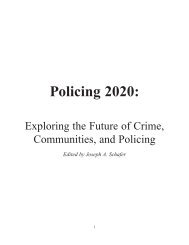Open Source Intelligence (OSINT) Greg S. Weaver - Futures ...
Open Source Intelligence (OSINT) Greg S. Weaver - Futures ...
Open Source Intelligence (OSINT) Greg S. Weaver - Futures ...
- No tags were found...
You also want an ePaper? Increase the reach of your titles
YUMPU automatically turns print PDFs into web optimized ePapers that Google loves.
53In Sharing the Secrets: <strong>Open</strong> <strong>Source</strong><strong>Intelligence</strong> and the War on Drugs,Holden-Rhodes (1997) offers acompelling, yet controversial, account ofhow “round five (p. 2)” of the War onDrugs beginning in the 1980s washindered by a lack of coordination,cooperation, and information sharingbetween various departments, agencies,and the military. The alleged underutilizationof <strong>OSINT</strong> is central to theseclaims. For example, Holden-Rhodescontends that <strong>OSINT</strong> can providevaluable information on drug traffickingand distribution.In Holden-Rhodes opinion, one of thefactors contributing to the failure of theWar on Drugs occurred years earlier.From 1969-74, the Nixon administrationcharacterized anti-drug efforts as anissue of national security. However,local, state, and federal law enforcementagencies have a prominent role indomestic drug issues, and itsrelationship vis-a-vis the military iscomplex. Poorly defined goals andunrealistic expectations led to politicalwrangling in a number of areas, andpolicy suffered. During the 1980s andbeyond, the emphasis on anti-drugefforts resulted in large increases inavailable funding. According to Turner(1999), various agencies anddepartments scrambled to secure theirshare of the figurative financial pie. Thiscompetition resulted in a lack ofcooperation between agencies, bothhorizontally (federal) and vertically(federal-state-local).The “national security versus crime”debate is apparent in terrorism policy aswell (for a recent review, see LaFree &Hendrickson (2007)), and there is nodearth of compelling arguments insupport of either position. A detaileddiscussion is not needed to recognizethat at times, the similarities between thewar on drugs and the developing policiesrelated to the global war on terror areunnerving. In essence, the author arguesthat the War on Drugs has beenineffective in large part because arational, unified strategy is lacking.Furthermore, without a clearly definedsystem of command and control, theobjectives at hand can be lost. He agreeswith Wilson (1983, p. 49) who asserts thata rational policy must clearly identifygoals and objectives and be geared torecognize the ones that are attainable(and those that are not) and what level ofinfluence the government has tomanipulate those goals or conditions toachieve the desired results. In short, the“Global War on Terror” falls on thecollective shoulders of a number ofagencies and departments, andcooperation is of utmost importance.REFERENCESBest, R. A., Jr. (2001). <strong>Intelligence</strong> andlaw enforcement: Counteringtransnational threats to the U.S. (CRSReport for Congress #RL30252).Washington, D.C.: CongressionalResearch Service.deBorchgrave, A., Sanderson, T., &MacGaffin, J. (2006). <strong>Open</strong> sourceinformation: The missing dimension ofintelligence (Report of the CSISTransnational Threats Project).Washington, D.C.: CSIS Press.Deflem, M. (2006). Europol and thepolicing of international terrorism:Counter-terrorism in a globalperspective. Justice Quarterly, 23,336–359.Evans, S. (2005). Law enforcement andDelphi: An exercise in strategicintelligence research. Low IntensityConflict & Law Enforcement, 13, 70–79.Gunaratna, R., & Chalk, P. (2002). Jane’scounter terrorism (2 nd ed.). Surrey,U.K.: Jane’s Information Group.


